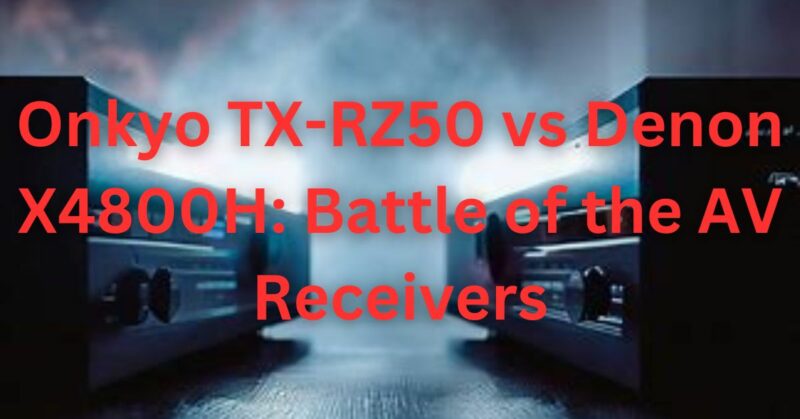When it comes to building a home theater system or a high-quality audio setup, an AV receiver is an essential component. Onkyo and Denon are two renowned brands that have consistently delivered top-notch audio equipment over the years. In this article, we will compare two of their flagship AV receivers: the Onkyo TX-RZ50 and the Denon X4800H. Both models offer impressive features and performance, but let’s delve deeper into their specifications and capabilities to determine which one suits your needs best.
Design and Build Quality
Starting with the design, both the Onkyo TX-RZ50 and the Denon X4800H boast a sleek and modern appearance. The Onkyo receiver features a clean front panel with a minimalist approach, while the Denon unit sports a slightly more detailed layout. However, it’s important to note that design preferences can vary, so this aspect ultimately comes down to personal taste.
In terms of build quality, both receivers are solidly constructed and built to last. The Onkyo TX-RZ50 has a sturdy chassis with high-quality components, ensuring durability and longevity. Similarly, the Denon X4800H is built with precision and attention to detail, making it a robust and reliable choice.
Audio Performance
When it comes to audio performance, the Onkyo TX-RZ50 and the Denon X4800H are equipped with advanced technologies to deliver exceptional sound quality.
The Onkyo TX-RZ50 supports the latest audio formats, including Dolby Atmos and DTS:X, providing immersive three-dimensional sound. With 11 channels of amplification, it delivers powerful and dynamic audio that fills the room. Additionally, the receiver employs AccuEQ room calibration to optimize sound quality based on your specific room acoustics.
On the other hand, the Denon X4800H also supports Dolby Atmos and DTS:X, enabling a captivating audio experience. It features 9 channels of amplification, which can be expanded to 11 channels using external amplifiers. The receiver incorporates Audyssey MultEQ XT32 room correction technology to analyze and adjust the audio output according to your room’s characteristics.
Connectivity and Features
In terms of connectivity, both receivers offer a wide range of options to accommodate various devices and setups. The Onkyo TX-RZ50 comes with multiple HDMI inputs and outputs, enabling seamless connectivity with Blu-ray players, gaming consoles, and other multimedia devices. It also supports 4K Ultra HD video pass-through with HDR10, HLG, and Dolby Vision compatibility, ensuring stunning visuals.
Similarly, the Denon X4800H features numerous HDMI inputs and outputs with HDCP 2.2 support, allowing for 4K Ultra HD video passthrough and upscaling. It also offers HEOS wireless multi-room audio streaming, allowing you to enjoy music throughout your home.
Both receivers provide networking capabilities, including built-in Wi-Fi and Bluetooth, allowing you to stream music wirelessly from various sources such as Spotify, Pandora, and AirPlay 2.
User Interface and Setup
The user interface plays a crucial role in the overall user experience of an AV receiver. The Onkyo TX-RZ50 features a user-friendly on-screen display with intuitive menus and a clear layout, making it easy to navigate through the settings and functions. Additionally, the receiver includes a comprehensive remote control that provides quick access to various features.
The Denon X4800H offers a similarly user-friendly interface, with an intuitive on-screen display and a well-designed remote control. Additionally, Denon provides a dedicated setup assistant that guides users through the initial installation process, making it simple for even novice users to set up the receiver correctly.
Room calibration is another crucial aspect of receiver setup, and both the Onkyo TX-RZ50 and Denon X4800H offer advanced calibration systems. The Onkyo receiver utilizes AccuEQ, which uses a provided microphone to measure your room’s acoustic properties and automatically adjusts the audio settings for optimal performance. Similarly, the Denon X4800H employs Audyssey MultEQ XT32, a highly regarded room correction technology that fine-tunes the receiver’s output based on your specific room characteristics, resulting in balanced and accurate audio reproduction.
Additional features and functionalities differentiate these receivers further. The Onkyo TX-RZ50 offers Chromecast built-in, allowing you to stream music directly from your smartphone or tablet. It also includes support for TIDAL and Deezer, popular music streaming platforms, providing a wide range of music options. On the other hand, the Denon X4800H features compatibility with the Denon Link HD, which optimizes the audio signal transmission between the receiver and Denon Blu-ray players.
Both receivers support multi-zone audio playback, allowing you to create separate audio zones in different areas of your home. This feature is ideal for those who want to enjoy music in one room while watching a movie in another. The Onkyo TX-RZ50 supports Zone 2 and Zone 3 outputs, while the Denon X4800H offers multi-room audio through its HEOS technology.
Price is another factor to consider when choosing between the Onkyo TX-RZ50 and Denon X4800H. As flagship models, both receivers are priced at a premium level. However, it’s worth noting that pricing may vary depending on the region and any ongoing promotions.
Conclusion
Choosing between the Onkyo TX-RZ50 and Denon X4800H ultimately depends on your specific requirements and preferences. Both receivers deliver outstanding audio performance, extensive connectivity options, and user-friendly interfaces. The Onkyo TX-RZ50 impresses with its 11-channel amplification, Dolby Atmos support, and AccuEQ room calibration. Meanwhile, the Denon X4800H offers 9-channel amplification, Audyssey MultEQ XT32 room correction, and HEOS wireless multi-room audio streaming.
Consider your specific needs, such as the size of your room, desired audio configuration, and preferred features, when making your decision. It’s also recommended to listen to both receivers if possible, as personal audio preferences can vary.
Ultimately, whether you choose the Onkyo TX-RZ50 or Denon X4800H, you can rest assured that you’ll be getting a high-quality AV receiver that will elevate your home theater or audio setup to new heights of performance and enjoyment.

